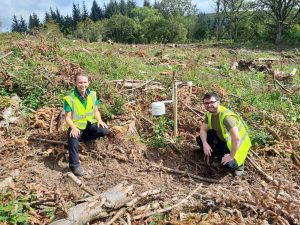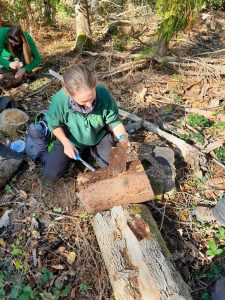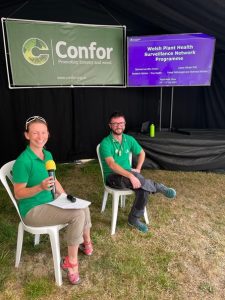Summary
 The Welsh Plant Health Surveillance Network (WPHSN) is a ground-breaking Welsh Government funded project designed to monitor native and invasive pests and pathogens that can pose a threat to health of plants and trees across Wales. Insect and spore traps installed at strategic woodland sites will allow us to record presence and/or abundance of insects and fungal spores. The insect samples are typically analysed by staff in Wales while others, and all the collected spores, are sent to our state-of-the-art plant health facilities at Alice Holt for in-depth laboratory testing. Data from the WPHSN will be used to inform the development of priority goals and policies relating to woodland management in Wales.
The Welsh Plant Health Surveillance Network (WPHSN) is a ground-breaking Welsh Government funded project designed to monitor native and invasive pests and pathogens that can pose a threat to health of plants and trees across Wales. Insect and spore traps installed at strategic woodland sites will allow us to record presence and/or abundance of insects and fungal spores. The insect samples are typically analysed by staff in Wales while others, and all the collected spores, are sent to our state-of-the-art plant health facilities at Alice Holt for in-depth laboratory testing. Data from the WPHSN will be used to inform the development of priority goals and policies relating to woodland management in Wales.
Full reviews of the first two fieldwork seasons are available for download below. These documents describe and report on the activities undertaken in each year of this innovative project. We have also produced a brief summary of key information contained in the 2023 report.
Research Objectives
 The objective of this ongoing research is to deliver the tree-based component of the Welsh Plant Health Surveillance Network (WPHSN), a Welsh Government plant health initiative. Biological samples collected by FR staff based in Wales are securely sent for analysis and diagnosis by Tree Health Diagnostic and Advisory Service laboratory staff based at Alice Holt and the Northern Research Station. Within the WPHSN, we will:
The objective of this ongoing research is to deliver the tree-based component of the Welsh Plant Health Surveillance Network (WPHSN), a Welsh Government plant health initiative. Biological samples collected by FR staff based in Wales are securely sent for analysis and diagnosis by Tree Health Diagnostic and Advisory Service laboratory staff based at Alice Holt and the Northern Research Station. Within the WPHSN, we will:
- deploy spore and insect traps across Welsh woodlands;
- collect data and build a distribution map of pests and pathogens, recording their abundance;
- assist with decision-making processes and informing the development of future policies and procedures relating to woodland management in Wales; and
- work with external agencies to grow a plant health surveillance network, allowing information and advice to be readily shared with the sector and providing accessible practical support for the early detection and identification of pests and pathogens.
Latest Update
2023 – the second season
- 33 cross vane-traps for the detection of Ips typographus and Ips cembrae bark beetles were deployed in carefully selected high risk sites across Wales, utilising the ‘J’ formation and a south-north axis line to ensure adequate coverage across Wales.
- 34 canopy insect traps were deployed in the Welsh Government Woodland Estate (managed by Natural Resources Wales) and at sentinel sites across Wales for the detection of oak processionary moth (OPM) and Agrilus spp.
- Fungal spore traps remain deployed at Talybont-on-Usk and at the National Botanic Gardens of Wales (NBGW), with additional surveillance carried out at The Cott in Southeast Wales.
- Collaboration with the sentinel site network has continued, with more sites coming on board this year and into 2024.
2022 – the first season
- 20 cross-vane traps for the detection of Ips typographus and Ips cembrae bark beetles were deployed in a J-shaped arrangement from mid to south Wales. The location of traps was informed by previous work led by Professor Hugh Evans.
- Fungal spore traps were deployed at Talybont-on-Usk and at the National Botanic Gardens of Wales (NBGW).
- Collaboration was initiated with staff managing some of the Wales plant health sentinel sites – initially those at NBGW, Loggerheads Country Park, Powis Castle, and Plas Newydd (Anglesey).
- A number of canopy insect traps were deployed on parts of the Welsh Government Woodland Estate (managed by Natural Resources Wales) and at two of the sentinel sites; Loggerheads Country Park and NBGW. Additional traps were installed between June and August for the detection of oak processionary moth (OPM) and Agrilus spp.
Our Involvement

- Research and development activities.
- Field surveys.
- Laboratory analyses.
- Data recording.
- Reporting to plant health officials in Wales.
- Collaboration with external agencies.
- Developing public awareness e.g., through knowledge exchange activities, digital media, and at the Royal Welsh Agricultural Show.
Downloads

Welsh Plant Health Surveillance Network Programme: 2022 review
An account of the activities and outcomes of the first year of this study.

Welsh Plant Health Surveillance Network Programme: 2023 review
An account of the activities and outcomes from the second full year of fieldwork.

The Welsh Plant Health Surveillance Network
Racheal Lee (2024) The Welsh Plant Health Surveillance Network BGjournal. Volume 21 (2), pp. 60-62. (Reproduced by kind permission of Botanic Gardens Conservation International.)
Funding & Partners
-
 This work is funded by the Welsh Government.
This work is funded by the Welsh Government.
